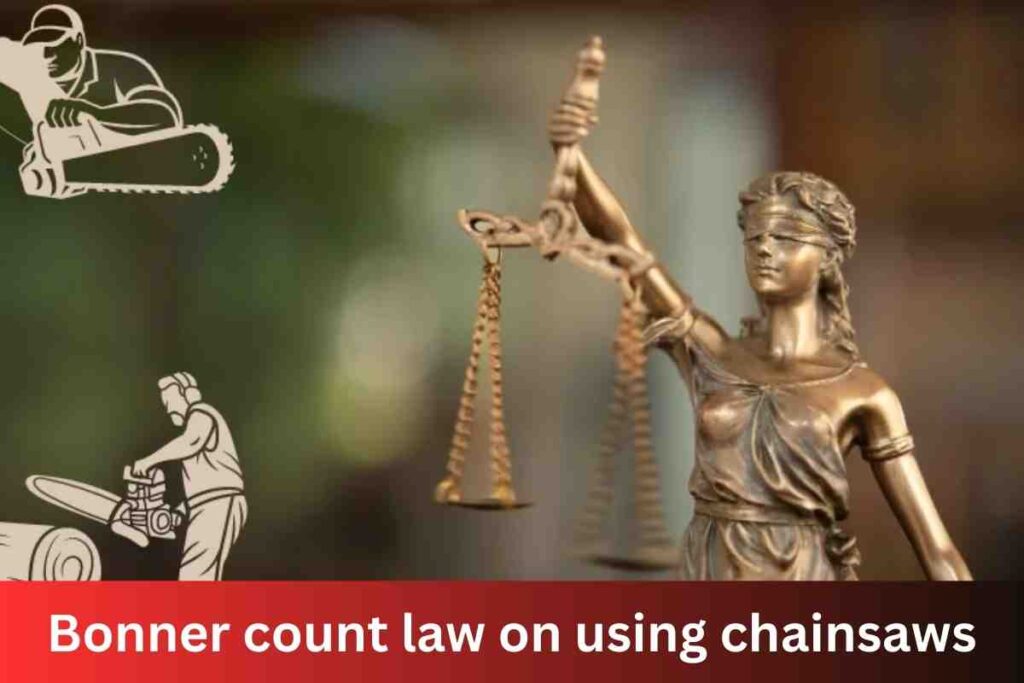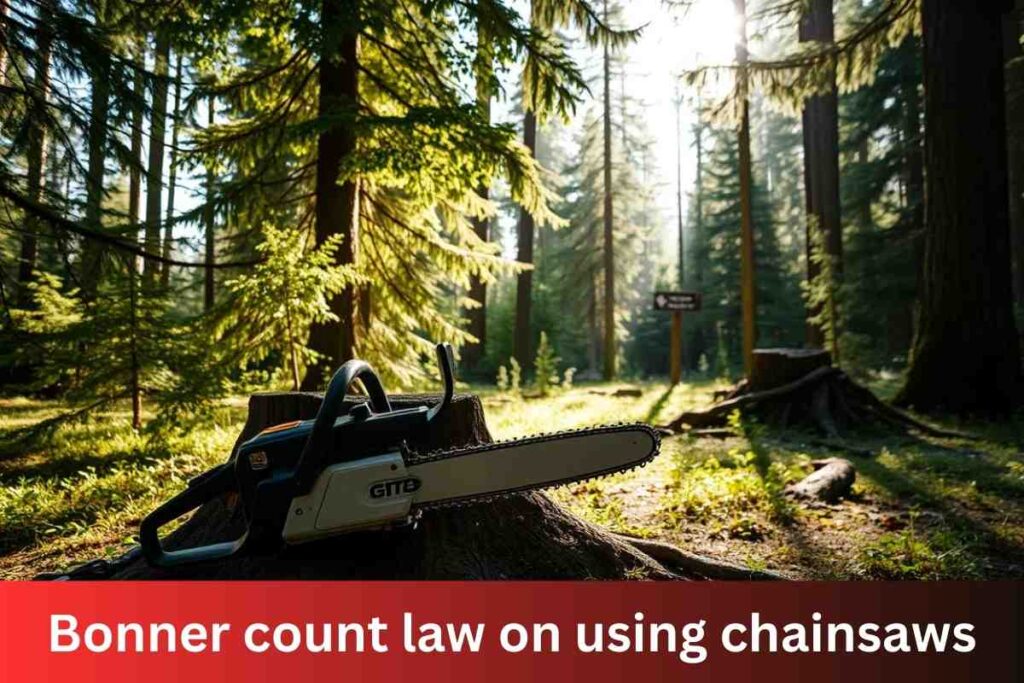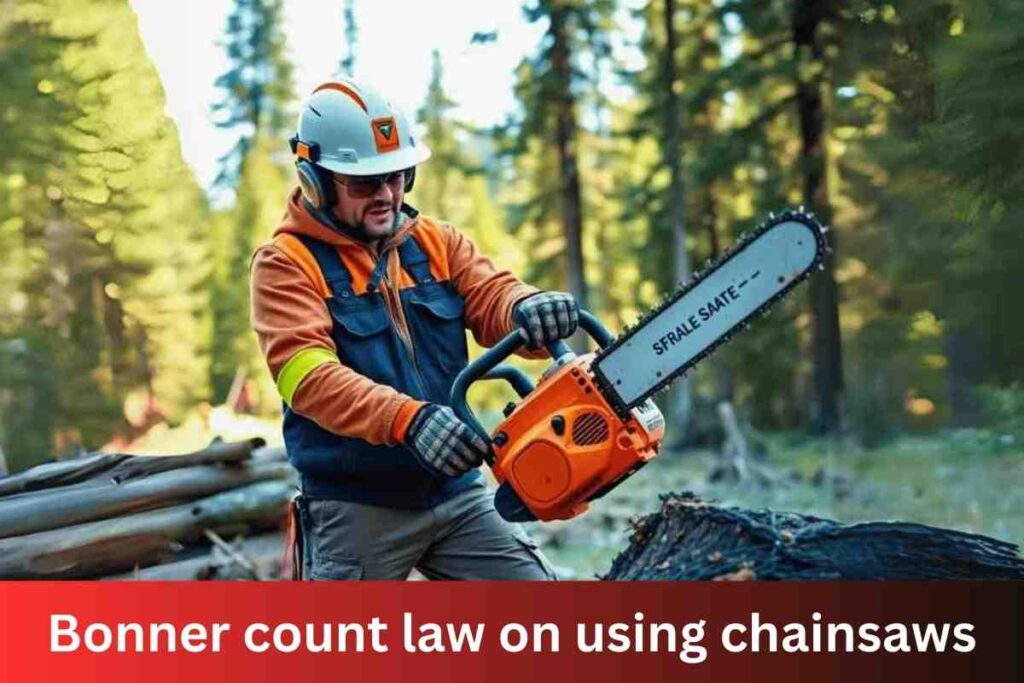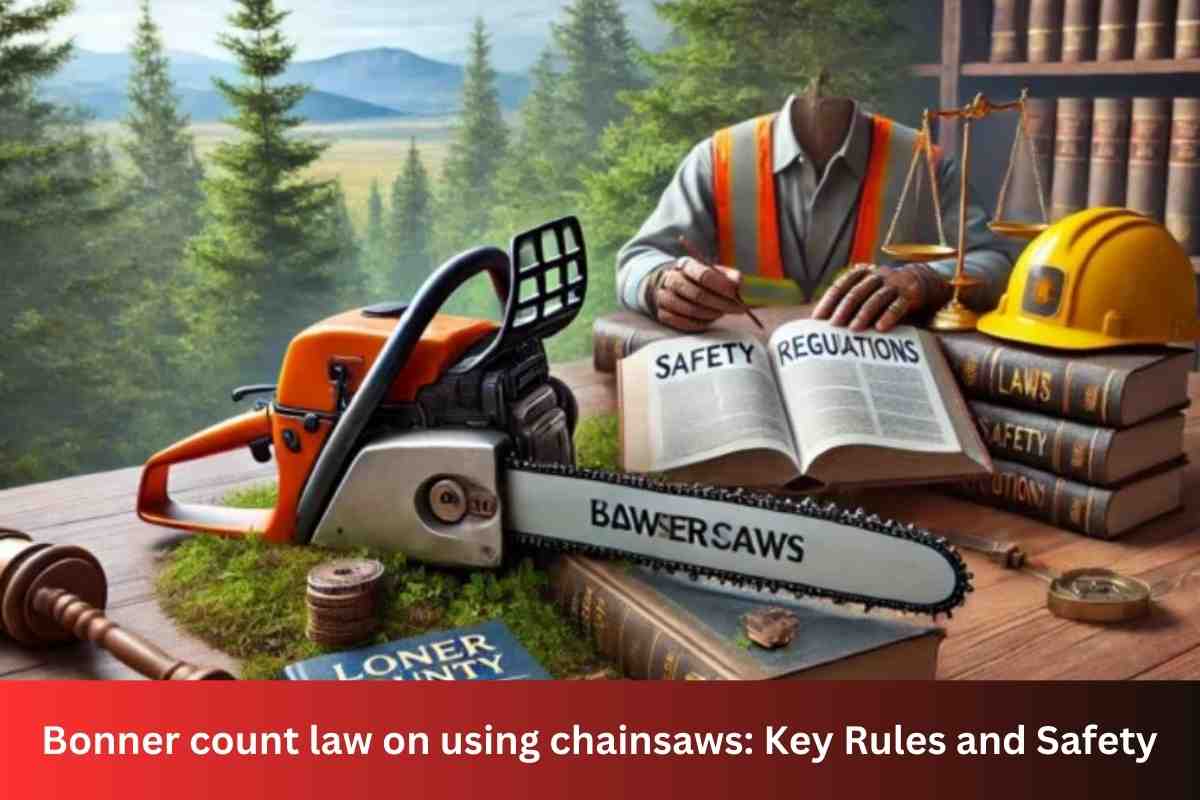- Chainsaw Use in Bonner count law on using chainsaws
- Do You Need a Permit to Use a Chainsaw in Bonner Count?
- Fire Season Restrictions for Chainsaw Use in Bonner Count
- Noise Restrictions for Chainsaws in Bonner Count
- Bonner count law on using chainsaws: Safety First
- Chainsaw Use in Rural Areas Environmental and Wildlife Considerations
- Chainsaw Maintenance: Staying Safe and Compliant
- Consequences of Breaking Chainsaw Laws in Bonner Count
- Safe and Legal Chainsaw Use in Bonner Count
- Conclusion
- FAQs
- What are the main regulations for using chainsaws in Bonner Count?
- What times of day am I allowed to use a chainsaw in Bonner Count?
- Can I use a chainsaw for emergency purposes without restrictions?
- Are there any restrictions on chainsaw use in environmentally sensitive areas?
- What safety gear is required when operating a chainsaw in Bonner Count?
- Can I use any type of chainsaw, or are there restrictions on model and power?
- What are the consequences of violating Bonner Count’s chainsaw regulations?
- How can I stay informed about changes in chainsaw regulations in Bonner Count?
Chainsaws are essential for land clearing, firewood cutting, and property maintenance in places like Bonner count law on using chainsaws, Idaho, where nature is a part of daily life.
However, using a chainsaw involves certain responsibilities, and understanding local regulations can help you stay safe and compliant.
In this article, we’ll discuss Bonner count law on using chainsaws, including permit requirements, fire season rules, noise restrictions, and best practices for chainsaw safety.
Chainsaw Use in Bonner count law on using chainsaws

Living in Bonner Count comes with the privilege of vast forests, majestic landscapes, and a rich outdoor lifestyle. But if you’re going to wield a chainsaw, you’ll need to do so within the boundaries of the law.
Do You Need a Permit to Use a Chainsaw in Bonner Count?
Generally, permits are not required for private chainsaw use on personal property in Bonner count law on using chainsaws.
If you’re cutting firewood or managing vegetation on your land, you can usually operate a chainsaw without a permit.
However, there are specific situations where you’ll need a permit:
Public Lands
Cutting trees or wood on federal lands, like national forests or Bureau of Land Management (BLM) lands, requires a timber or firewood collection permit.
Fire Season
During Idaho’s fire season, typically June through October, restrictions on chainsaw use may apply.
A permit might be needed, or use may be restricted based on fire danger levels. Always check with local authorities, especially during fire season, to ensure compliance with the latest regulations.
Fire Season Restrictions for Chainsaw Use in Bonner Count
Bonner count law on using chainsaws, like much of Idaho, is prone to wildfires during the dry summer months. To reduce the risk of wildfires, chainsaw use is highly regulated during fire season.
Here’s what to keep in mind:
Check Fire Danger Ratings
Bonner Count frequently updates its fire danger ratings. If fire danger is high, chainsaw use may be restricted or banned entirely.
Required Fire-Safety Equipment
If chainsaws are permitted, you may be required to have fire suppression tools, like a shovel, water, and a fire extinguisher, on hand.
Monitor Local Restrictions
Fire restrictions vary by area, so always consult the Bonner Count Fire Restrictions page or contact local authorities.
Noise Restrictions for Chainsaws in Bonner Count
Chainsaws are loud and can easily disrupt neighbors, especially in residential areas. Bonner count law on using chainsaws has local noise restrictions to minimize disturbances:
Residential Zones
In residential areas, chainsaw use is usually restricted to certain hours, often between 7 AM and 8 PM. Check with your local township or homeowners’ association for specific hours, as they may vary.
While rural zones may have more lenient rules, practicing courtesy by avoiding early-morning or late-night chainsaw use goes a long way in maintaining neighborly relationships.
Bonner count law on using chainsaws: Safety First

Operating a chainsaw safely should be a top priority. Although there’s no law requiring safety gear for personal chainsaw use, the following equipment is highly recommended:
- Helmet: Protects your head from falling branches and debris.
- Eye Protection: Safety glasses or a face shield guards your eyes against flying wood chips.
- Hearing Protection: Chainsaws can damage hearing over time; use earplugs or earmuffs.
- Chainsaw Chaps: Designed to prevent leg injuries in case of accidental contact with the chain.
- Gloves: Provide a better grip and protect your hands from vibrations and sharp objects.
Safety gear may be legally required in public work zones, such as logging areas.
Chainsaw Use in Rural Areas Environmental and Wildlife Considerations
In rural Bonner Count, chainsaw use is sometimes regulated to protect the local environment and wildlife.
Key points include:
Wildlife Protection
To reduce disturbance, chainsaw use may be limited during certain wildlife seasons, such as nesting or mating periods.
Environmental Concerns
Excessive chainsaw use near protected areas, rivers, or parks can damage the environment. Always check local guidelines for any specific conservation restrictions.
Chainsaw Maintenance: Staying Safe and Compliant
Proper maintenance is crucial for safe chainsaw operation. Regularly inspect your chainsaw to ensure all parts are in working order:
Sharp Chain
Dull chains increase kickback risks and make cutting more difficult.
Clean Air Filter
Ensures smooth performance and prevents engine damage.
Working Chain Brake
Essential for quickly stopping the chain in an emergency.
Regular maintenance reduces the likelihood of accidents and ensures your chainsaw is reliable.
Consequences of Breaking Chainsaw Laws in Bonner Count
Failing to follow Bonner count law on using chainsaws can result in fines or even more severe penalties:
Fines and Penalties
Immediate Fines
Violating chainsaw regulations, such as operating during restricted hours or failing to adhere to noise restrictions, can result in immediate fines. These fines vary depending on the severity of the infraction but are typically issued to deter future violations.
Escalating Penalties for Repeat Offenders
Repeated violations can lead to escalating fines, making it increasingly costly for individuals disregarding local chainsaw laws.
Community Service Requirements
Some infractions may require offenders to complete community service, especially if the violation involved environmental harm. This can include tasks like clearing trails, cleaning public spaces, or other service projects that benefit the community.
Suspension or Revocation of Permits
Loss of Privilege to Operate
Chainsaw users who repeatedly violate Bonner Count regulations may have their operating permits suspended or revoked. This affects individuals or businesses that require chainsaw use for activities such as logging, land clearing, or construction.
Restricted Permit Reapplication
Violators may sometimes need to wait a specific period or complete additional training before they can reapply for a permit.
Environmental Damage and Restoration Costs
- If a violation results in environmental damage, violators may be required to pay for restoration costs. This can involve replanting trees, restoring natural habitats, or taking other reparative measures.
- Areas impacted by repeated chainsaw law violations may face increased monitoring by environmental agencies, which will affect both violators and other residents who follow the law.
Civil or Criminal Liability
Legal Action for Severe Violations
In cases where a violation leads to significant harm, such as endangering public safety or causing property damage, the violator could face civil or criminal charges. These charges might lead to court appearances, potential jail time, and additional penalties.
Liability for Damages
If someone’s chainsaw usage causes injury to others or damages property, they could be held liable for medical costs, property repairs, and other expenses.
Increased Community Disapproval and Reputation Damage
Social Consequences
Bonner count law on using chainsaws residents value peaceful, natural surroundings. Consistently breaking chainsaw laws can lead to social disapproval within the community. Individuals or businesses known for repeated violations might experience a decline in community trust and support.
Business Impact
For companies or contractors, a poor reputation due to non-compliance with chainsaw laws could result in lost business opportunities, as customers may prefer companies that prioritize safety and environmental responsibility.
Mandatory Safety Training or Education Courses
- Violators may be required to complete safety training or education courses focused on responsible chainsaw use. This ensures that users understand the importance of the regulations and are better equipped to follow them in the future.
- These mandated courses may be expensive for the violator, adding a financial burden to other penalties.
Property Access Restrictions
Violators may be restricted from accessing specific areas within Bonner Count, especially if they’ve caused environmental damage. This restriction can limit access to valuable resources for those who rely on chainsaw usage as part of their livelihood.
Safe and Legal Chainsaw Use in Bonner Count

Before you start, run through this quick checklist to ensure you’re within legal bounds and practicing safe chainsaw use:
Check Local Laws and Restrictions
Verify that there are no fire bans, noise restrictions, or permit requirements for your activity.
Inspect Safety Gear
Equip yourself with a helmet, eye protection, hearing protection, gloves, and chainsaw chaps.
Perform Maintenance
Ensure your chainsaw’s chain is sharp, brakes are functional, and the air filter is clean.
Check Fire Danger Ratings
Especially during dry months, always check local fire danger levels.
Be Neighborly
Avoid chainsaw use during early or late hours, especially in residential zones.
Conclusion
The Bonner count law on using chainsaws emphasize safety, environmental consideration, and community respect.
The regulations seek to minimize noise disruptions, ensure safe operation, and protect natural resources.
Chainsaw users are encouraged to follow prescribed guidelines, including using chainsaws only during designated hours, adhering to noise restrictions, and obtaining any required permits for larger projects.
By following these laws, residents and visitors contribute to a safer, more harmonious environment, preserving the tranquility and integrity of Bonner Count’s natural landscapes.
FAQs
What are the main regulations for using chainsaws in Bonner Count?
Chainsaw use in Bonner Count is regulated by specific hours of operation, noise limits, and safety requirements to protect public safety and reduce environmental impact. Permits may be required for commercial use.
What times of day am I allowed to use a chainsaw in Bonner Count?
Chainsaw use is generally allowed during daylight hours to minimize noise disturbance. Specific hours may vary by location, so checking local ordinances for exact times is recommended.
Can I use a chainsaw for emergency purposes without restrictions?
Chainsaws can usually be used without restrictions during emergencies, such as clearing trees after a storm. However, it’s advisable to confirm with local authorities if in doubt.
Are there any restrictions on chainsaw use in environmentally sensitive areas?
To protect natural habitats and ecosystems, Bonner Count may have stricter regulations on chainsaw use in sensitive areas, like parks, wildlife reserves, or near water bodies.
What safety gear is required when operating a chainsaw in Bonner Count?
Operators are typically required to wear safety gear, including protective eyewear, gloves, hard hats, and, in some cases, ear protection, especially in commercial operations.
Can I use any type of chainsaw, or are there restrictions on model and power?
Some models, particularly high-power or industrial chainsaws, may have restrictions in residential areas due to noise and safety concerns. It’s best to review local guidelines or consult authorities.
What are the consequences of violating Bonner Count’s chainsaw regulations?
Violations may result in fines, warnings, or, in severe cases, criminal charges. Repeated non-compliance can lead to increased penalties.
How can I stay informed about changes in chainsaw regulations in Bonner Count?
You can stay updated by checking the Bonner Count government website, subscribing to local notifications, or contacting the county office for the latest information on chainsaw use policies.




